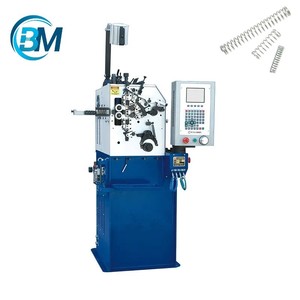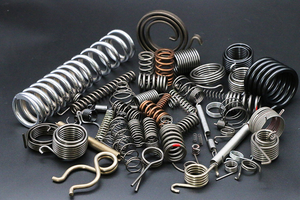(276 products available)






































































































































































































A CNC spring coiler is a specialized piece of equipment designed to manufacture springs with precision automatically. Various types are available, of which the computer numerically controlled type is the most advanced and widely used in modern spring production.
Manual spring coilers:
Manual spring coilers are the traditional devices that rely on manual operations to coil wire into spring shapes. Operators manually wrap the wire around a rotating peg or mandrel to create the spring. While they allow for some degree of operator control, manual coilers are limited in precision and efficiency. Moreover, producing springs of consistent quality is difficult.
Automated spring coilers:
Automated spring coilers eliminate the need for manual winding by automating the coiling process. These devices often use pneumatic or electric motors to coil the wire, significantly reducing labor and increasing productivity. However, they may still require manual setup and adjustments for different spring designs.
CNC spring coilers:
A CNC (computer numerical control) spring coiler is a sophisticated device that uses computer control to automate the coiling of wire into springs precisely. This machine achieves high production efficiency and precision by supporting various spring shapes and sizes and allowing for rapid setup and changes through digital programming. A spring coiling machine with a CNC controller can typically coil and bend materials like round wire into complex shapes and custom springs with utmost accuracy.
CNC coiling machines have different specifications depending on the metal spring they are meant to coil. Here are some common specifications.
Spring Size Range
The CNC spring coiling machine fittings range from tiny springs like hairpin springs of about 0.5 mm to large 20mm springs used in heavy machinery.
Coil Diameter Control
A machine like a PVC spring coiler has the ability to adjust the coil diameter. Some have automatic coil diameter controls using software and others have manual controls where the operator uses the control levers to adjust the diameter before coiling begins.
Pitch Control
Pitch is the distance between each coil. Like coil diameter, pitch can also be adjusted before coiling begins. If coils are laid tight, the pitch will be smaller, and if the coils are laid loosely, the pitch will be bigger.
Coil Direction
A spring coiler machine can make coils in both clockwise and anticlockwise directions. The desired direction will depend on the insertion of a pin or shaft at the time of use.
Configurable Ends
An end configuration is the shape at the ends of the spring. Some CNC spring coilers have the capability to change the shape at the end of the spring coil. Usually, manufacturers will customize the ends according to the needs of the application.
Maintaining a spring coiling machine is very critical, especially if it is being heavily used in a manufacturing industry. The process of coiling can put a lot of pressure on joint parts, the collator, the cutter, and even the computer control system. To mitigate damage, here are some maintenance tips:
Lubricate Moving Parts
The machine's moving parts, especially the spring coiling tool, should be greased regularly. Lubrication lowers wear and tear and prevents obstructions and breakdowns caused by dirt and dust.
Spare Parts Supply
It's important to assess the spring coiling machine's needs in terms of replacement parts. Find a vendor who is capable of providing the necessary spare parts quickly so that downtime is reduced.
Annual Maintenance Check
Annual maintenance checks can provide long-term benefits. While it incurs a cost, the backlash of unplanned downtimes can be catastrophic. Also, daily, coiling machines are put under pressure to meet production targets. A single failure can impact the entire manufacturing spring.
The usage applications for a CNC spring coiling machine are numerous and widespread. It includes the furniture making industry, automotive industry, machinery manufacturing industry, electrical and telecommunication industry, medical equipment industry, transportation industry, construction and engineering industry, hardware industry, appliance industry, and customization industry. This is just a short list of industries that use a CNC spring machine to produce springs for various equipment and devices.
The versatility of this machine is so high that it is mostly used to produce compression springs, tension springs, and torque or flat springs, among other kinds of springs that are useful in diverse fields of industry.
When selecting a suitable CNC spring machine, several key factors need to be considered to ensure the choice aligns with specific requirements and applications. The following table summarizes some essential tips when buying these types of machines:
Q1: Which springs can a coiler make?
A1: A CNC spring coiler can create torsion springs, compression springs, tension springs, and other specialized designs.
Q2: What types of materials are used with spring coil machines?
A2: Coiling machines can work with various wire materials, including stainless steel, carbon steel, alloy spring steel, and specialized materials like titanium or music wire.
Q3: What software is used to program the CNC spring coiler?
A3: The specific software can vary by machine manufacturer, but it will typically be a CNC programming software compatible with the coiler's CNC control unit.
Q4: What is the maximum coil diameter the CNC spring coiler can accommodate?
A4: Maximum coil diameter varies by machine model. Some may handle coils up to 8 inches, while others can coil up to 12 or more.